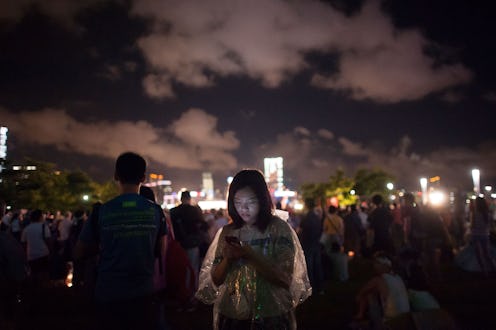News
Hong Kong Protesters Aren't Going Anywhere
The Hong Kong government canceled talks with protestors, but that didn't stop pro-democracy demonstrators from coming out to support their cause. On Friday, protesters in Hong Kong reassembled by the thousands, one day after Chief Secretary Carrie Lam said "constructive dialogue" would be impossible once demonstrators stepped up the call to occupy the streets.
Dubbed the "Umbrella Revolution", the protests are a response to the Chinese government's overbearing role in their elections. The catalyst for the roiling protests was Beijing endorsing veto authority on Hong Kong candidates for the top elected office, Chief Executive. Pro-democracy citizens want the freedom to choose their own candidates, but as things stand, candidates have to have the backing of a nominating committee littered with Beijing loyalists.
This time around, students arrived bearing tents and food and water supplies, even setting up makeshift showers, indicating that they were in it for the long haul. The protests have blocked major roads and caused massive traffic and commuter chaos. According to Bloomberg Businessweek, Alex Chow, the 24-year-old General Secretary of the Hong Kong Federation of Students, said:
We do admit we are causing inconvenience to the people, but this is to have long-term gains through short-term pain. No one will give up now until we get a significant achievement.
The defining quality of the protesters is their age — a majority of them are young students, who not only are participants but also leaders and organizers of the protests that are unnerving both Hong Kong and Chinese authorities.
Although the number of protesters have dwindled and its momentum has slowed down somewhat since its start in September, student leaders have channeled anger from the government backing out of talks to revitalize the protests.
On Thursday, Lam also told reporters that the other side had undermined trust in their calls to bring out protesters.
The dialogue cannot be deployed as an excuse to incite more people to join the protest. The illegal occupation activists must stop.
Hong Kong was returned to Chinese rule in 1997, and is governed under a "one country, two systems" agreement. The Pearl of the Orient, as it is affectionately known, has guaranteed civil liberties that don't exist on the mainland, including freedom of speech and the right to protest. Some analysts say that these protests may provoke Beijing to justify more political heavy-handedness in Hong Kong in the future.
The protests are reminiscent of Tiananmen Square in 1989, where massive student-led protests turned into a violent massacre, sending shockwaves throughout the world. The Umbrella Revolution though, is markedly different: firstly, both the Chinese and Hong Kong economies have improved (although the wealth gap in Hong Kong has fueled the protests) since the days of Tiananmen Square, and in relation to its bigger, more powerful neighbor, Hong Kong has an open society, less corruption, and more freedom of expression.
But the youth and persistence of the protesters in Hong Kong are alarming to Chinese officials, as other nations under its sovereignty carefully watch the outcome of the protests.
Images: Getty Images (3)
